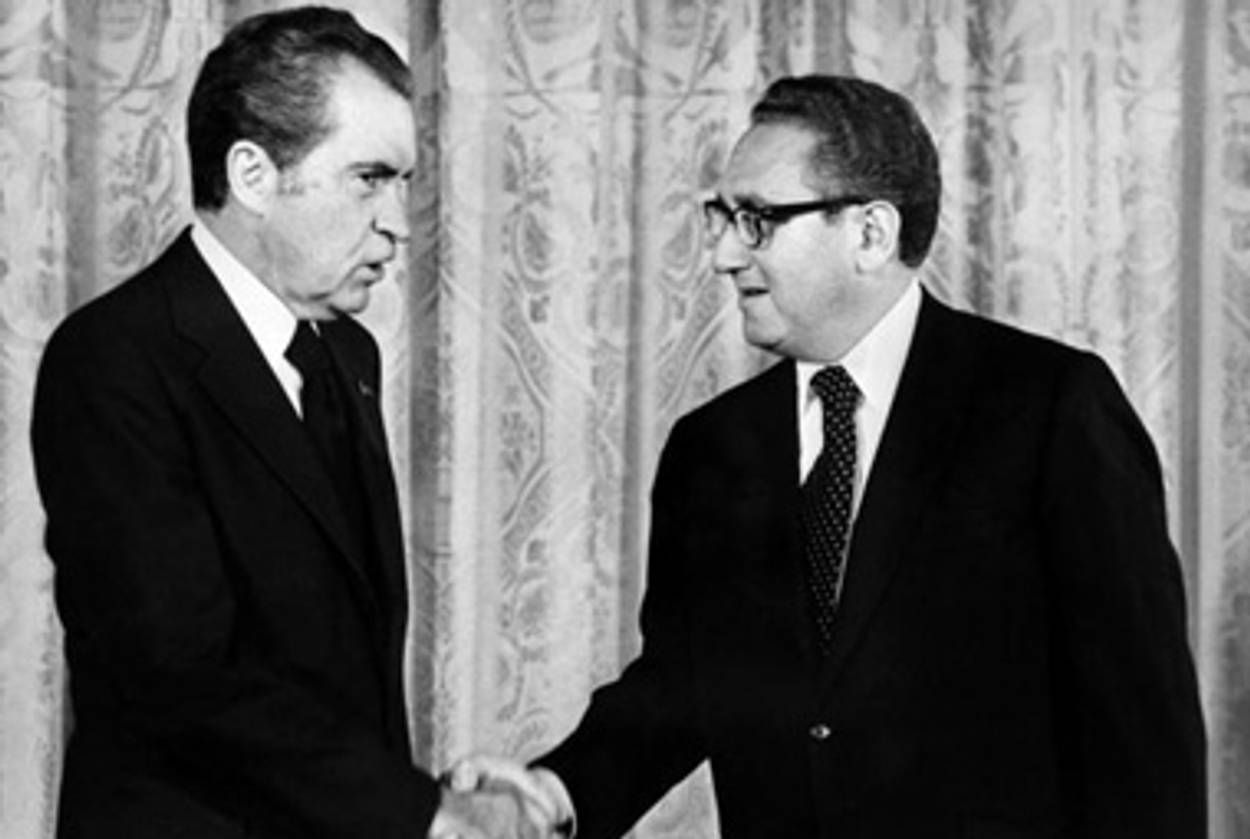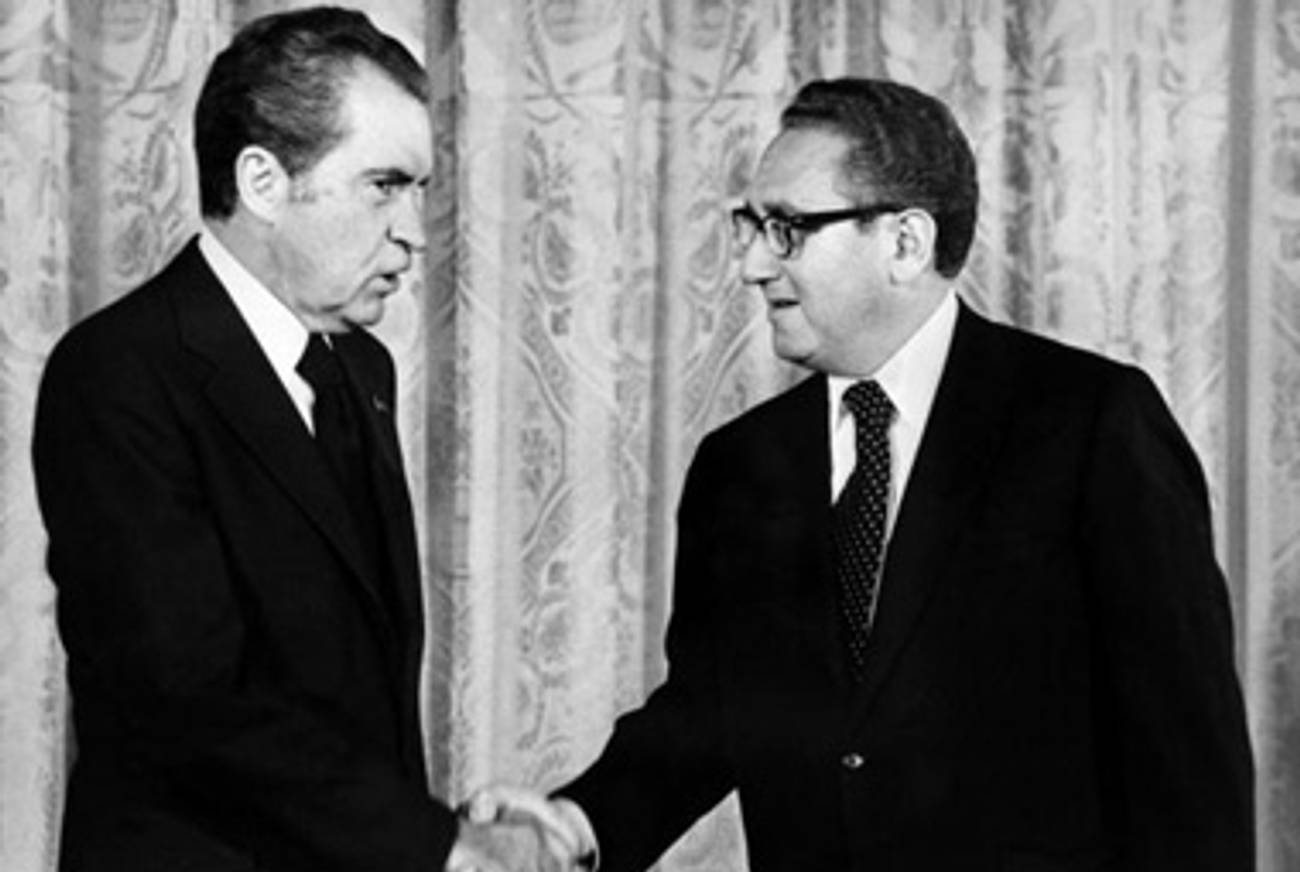Why Kissinger Dismissed the Soviet Jews
Gal Beckerman explains newly revealed ‘gas chambers’ remark




The big news from the latest release from the Nixon White House tapes—a.k.a. the gift that keeps on giving—does not come from the man himself (he rants against Jews, blacks, and Italians, surprise surprise), but from his most notorious adviser, at least among the un-indicted ones. On March 1, 1973, President Nixon met with Golda Meir. The Israeli prime minister urged Nixon to pressure the Soviets into letting at least some of her people go. But afterward, Nixon’s national security adviser, Henry Kissinger, expressed that the administration should not heed Meir’s request.
“The emigration of Jews from the Soviet Union is not an objective of American foreign policy,” he said. “And if they put Jews into gas chambers in the Soviet Union, it is not an American concern. Maybe a humanitarian concern.”
Responded Nixon: “I know. We can’t blow up the world because of it.”
After getting over the initial shock at a German-born Jew saying such things, I called Gal Beckerman, a Forward reporter and author of the new When They Come For Us, We’ll Be Gone, a history of the movement to save Soviet Jewry that both The New Yorker and the Washington Post just named among the best books of the year. (Tablet Magazine critic Adam Kirsch liked it, too; I’d further highly recommend Yossi Klein Halevi’s much more personal take in The New Republic.)
Beckerman shared my shock at Kissinger’s choice of imagery, but was unsurprised at the content behind the quip. “In my darkest imaginings, that’s what I thought he was thinking, but I never assumed he was actually articulating it quite that way, or would use the Holocaust language,” he said. “This is not outside of Kissinger’s political philosophy. In fact, it’s almost the perfect distilled example of his realpolitik, except it’s this extreme realpolitik, where basically we have blinders on except for things that concern us geo-strategically, and if it’s a moral issue—a question of what a country is doing to its own citizens—that’s just outside the realm of our consideration as a country.”
The context for the meeting and the remarks, Beckerman explained, was the Jackson-Vanik Amendment, which was then a proposal (it was passed the next year) that linked most-favored-nation status in trade deals with the potential trade partner’s emigration policies. Its prime impetus, of course, was the Soviet Union and its Jews: It was designed to coax the U.S.S.R. into permitting its Jews to leave, with most-favored-nation status as a carrot.
Nixon opposed this strategy. “The future of détente with the Soviet Union is liable to be foiled by the Congress,” Nixon told Meir, Beckerman reports in his book. “Personally I can get better results for you.” (Beckerman notes that Nixon’s realpolitik thinking was largely the result of Kissinger: In his prior political incarnation, Nixon was a hardcore ideological Cold Warrior.)
“At this particular moment,” Beckerman told me, “this is when things were really turning in that direction. [Sen. Henry “Scoop” Jackson, the amendment’s main sponsor,] had a huge amount of congressmen backing him and the whole Jewish organizational world behind him.”
The legacy of Jackson-Vanik goes well beyond its immediate consequences for Soviet-American relations, international trade, and even the question of Soviet Jewry, Beckerman argues. “This was unprecedented,” he said, “that Congress would tell the president, ‘We’re going to sabotage your foreign policy.’” Along with the more activist Congress, according to Beckerman, Jackson-Vanik marked a turn away from the dominance of realpolitik and toward human rights, so famously trumpeted by President Carter in his 1977 inaugural address. Jackson-Vanik, said Beckerman, “was like a grenade in the middle of détente.”
But back to Kissinger. His duplicity regarding Jackson-Vanik, Beckerman told me, would come to involve hiding a secret letter in which the Soviets backed off from a deal under which they would be waived from Jackson-Vanik in exchange for allowing 60,000 Jews to emigrate. (The jig was up only when the Soviets angrily printed the letter in one of their newspapers.) “To give credit to his political philosophy,” Beckerman said, “Kissinger thought that by not dealing with these moral issues but trying to create a more stable world, everyone would benefit. And that’s what Nixon is saying in his retort to Meir.”
But that is about all the credit Beckerman, who a few years ago published an excellent review about the history and psychology behind Kissinger’s views, can muster. “If anybody was going to understand!” he told me. “Kissinger got out in the ‘30s, and then he went back with the Army after the war to be part of the occupation. When he’s talking about gas chambers, it’s not an abstract concept. He lost family.”
“The amazing part about that quote,” Beckerman added, “is the word ‘maybe.’ It’s ‘maybe a humanitarian concern.’”
In Tapes, Nixon Rails About Jews and Blacks [NYT]
Related: Last Exit [Tablet Magazine]
Glory [TNR]
Kissinger, Unearthed [Forward]
Marc Tracy is a staff writer at The New Republic, and was previously a staff writer at Tablet. He tweets @marcatracy.